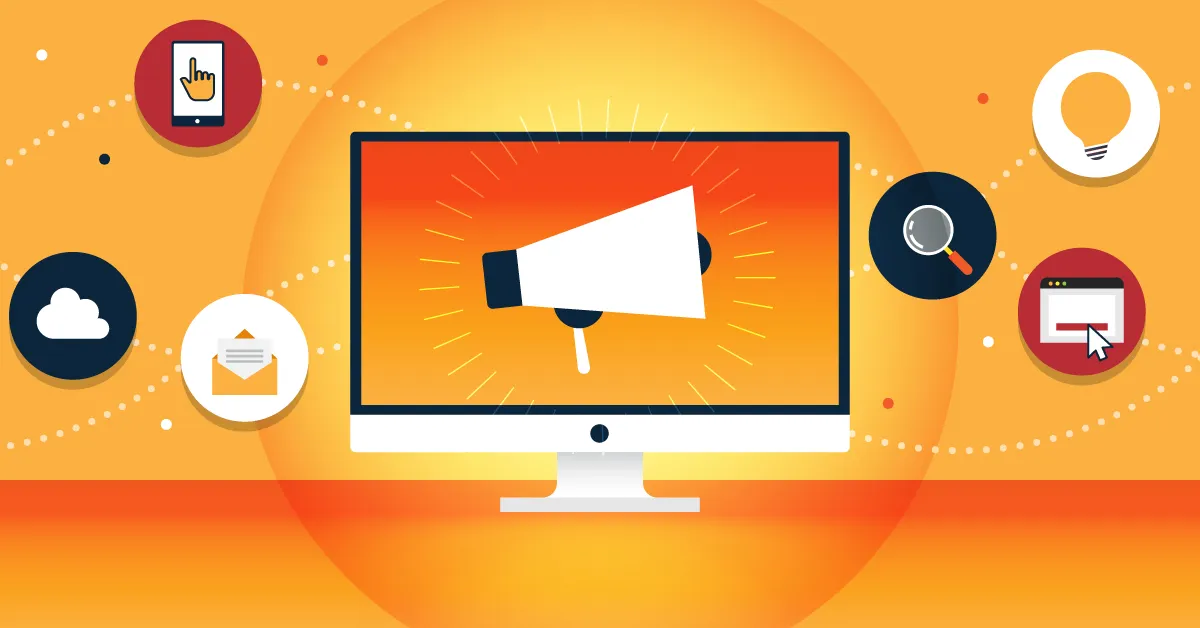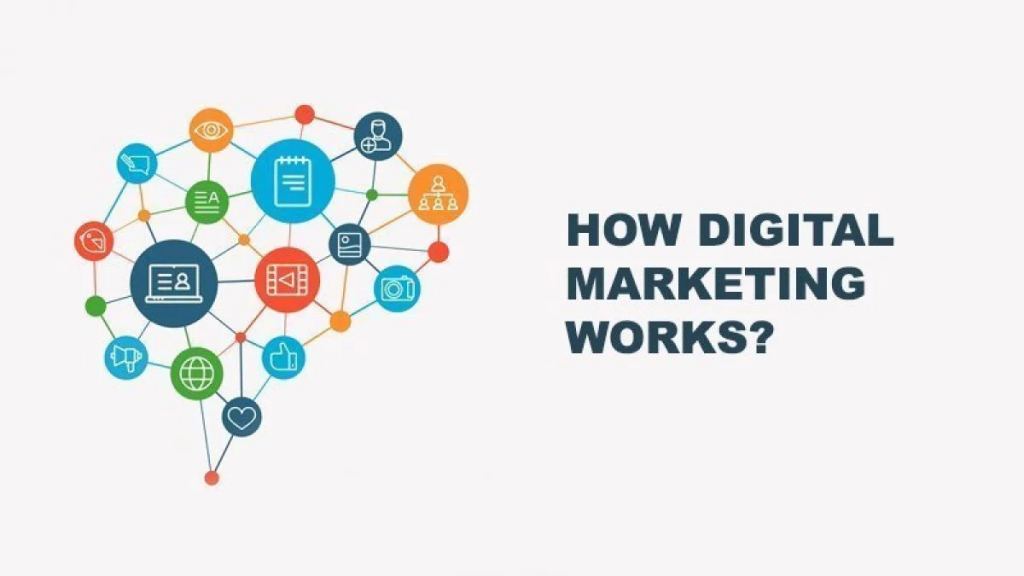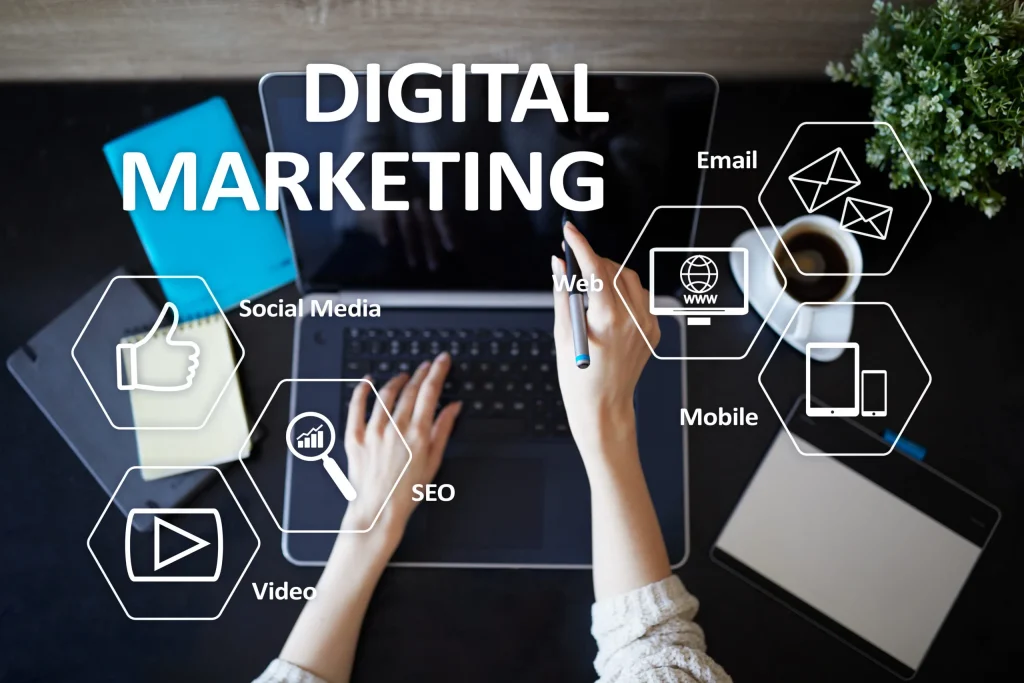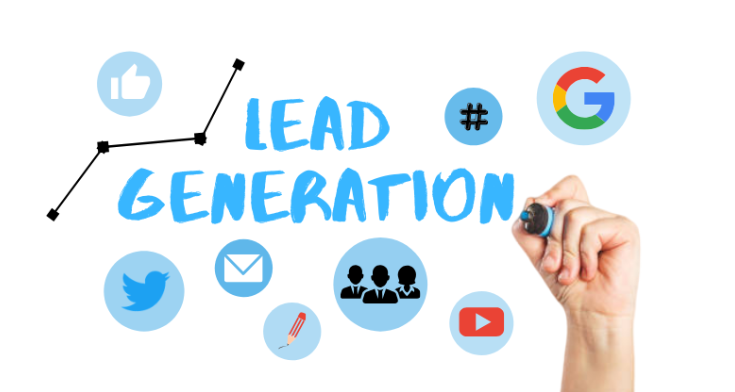Digital marketing encompasses various online strategies to promote products or services. It leverages digital channels such as websites, social media, search engines, email, and more to reach and engage with potential customers. In today’s digital age, having a strong online presence is crucial for businesses to connect with their target audience and stay competitive.
Choosing the right type of digital marketing is essential for maximising effectiveness and achieving business goals. Each method, whether it’s SEO, PPC advertising, social media marketing, content marketing, or email marketing, offers unique advantages and caters to different audience preferences. By selecting the most suitable strategy based on factors like target audience demographics, budget, and marketing objectives, businesses can optimise their efforts and achieve better results.
Table of Contents
Search Engine Optimization (SEO)
Search Engine Optimization, or SEO for short, is all about making your website more visible on search engines like Google or Bing. When someone searches for something online, they type in keywords or phrases, and SEO helps your website show up higher in those search results.
To do this, SEO involves a few important things. First, it means choosing the right words and phrases that people are likely to search for. These are called keywords. Then, you need to use those keywords naturally in your website’s content, like in articles or product descriptions.
Another important part of SEO is getting other websites to link back to yours. This shows search engines that your site is trustworthy and authoritative. It’s like getting recommendations from other people – the more recommendations you have, the better.
Overall, SEO is about making your website the best it can be for both users and search engines. By doing this, you can attract more visitors to your site, increase your online visibility, and ultimately, grow your business.
Pay-Per-Click Advertising (PPC)
Pay-Per-Click Advertising, or PPC, is a way of advertising online where you only pay when someone clicks on your ad. It’s like renting space on the internet to show your ads, but you only pay when someone actually interacts with them.
PPC ads can appear on search engines like Google or Bing, as well as on social media platforms like Facebook or Instagram. They usually show up at the top or bottom of search results or in the sidebar of websites and social media feeds.
To create a PPC ad, you choose the keywords or demographics you want to target, write a short ad, and set a budget for how much you’re willing to spend each day or month. Then, whenever someone searches for those keywords or fits those demographics, your ad has a chance to appear.
One of the great things about PPC is that you can track exactly how well your ads are performing. You can see how many people are clicking on them, how much each click is costing you, and whether those clicks are turning into sales or other desired actions on your website. This allows you to adjust your ads in real time to get the best results for your money.
Social Media Marketing (SMM)
Social Media Marketing, or SMM, is all about using social media platforms like Facebook, Instagram, Twitter, and LinkedIn to promote your business or brand. It’s like word-of-mouth advertising, but on the internet and at a much larger scale.
With SMM, businesses can create profiles or pages on social media platforms to connect with their target audience. They can share content like posts, photos, videos, and stories to engage with followers and build relationships.
One of the key advantages of SMM is its ability to target specific demographics and interests. Social media platforms have a wealth of data about their users, which allows businesses to tailor their marketing efforts to reach the right people at the right time.
SMM is not just about advertising; it’s also about building a community around your brand. By interacting with followers, responding to comments and messages, and sharing valuable content, businesses can foster trust and loyalty among their audience.
Content Marketing
Content Marketing is the practice of creating and sharing valuable, relevant, and consistent content to attract and engage a target audience. It’s about providing useful information or entertainment to potential customers rather than directly promoting a product or service.
In content marketing, businesses create various types of content such as blog posts, articles, videos, infographics, podcasts, and social media posts. The goal is to educate, inform, or entertain the audience while subtly showcasing the brand’s expertise and values.
Unlike traditional advertising, content marketing focuses on building long-term relationships with customers by delivering content that addresses their needs and interests. By providing valuable content, businesses can establish themselves as trusted authorities in their industry and earn the loyalty of their audience.
A key aspect of content marketing is distribution. Creating great content is only half the battle; it also needs to be effectively distributed to reach the target audience. This involves leveraging various channels such as social media, email newsletters, search engines, and content syndication platforms.
Email Marketing
Email Marketing is a digital marketing strategy that involves sending commercial messages to a group of people via email. These messages can include promotional offers, product updates, newsletters, event invitations, and more.
One of the main benefits of email marketing is its ability to reach a targeted audience directly. Businesses can segment their email lists based on factors like demographics, purchase history, or interests, allowing them to send personalized and relevant content to each subscriber.
Email marketing campaigns typically involve creating compelling email content, designing visually appealing templates, and optimizing for deliverability and open rates. Marketers often use email marketing software to manage subscriber lists, automate campaigns, and track performance metrics like open rates, click-through rates, and conversions.
Influencer Marketing
Influencer Marketing is a type of digital marketing strategy that involves partnering with influential individuals or personalities to promote products or services. These influencers have a dedicated and engaged following on social media platforms like Instagram, YouTube, TikTok, and blogs.
The key idea behind influencer marketing is to leverage the influencer’s credibility, trust, and reach to connect with their audience and promote a brand’s message. Instead of directly advertising to consumers, brands collaborate with influencers who create content that integrates the brand’s products or services naturally and authentically.
Influencer marketing campaigns can take various forms, including sponsored posts, product reviews, giveaways, and affiliate marketing. The success of an influencer marketing campaign often depends on finding the right influencers whose audience aligns with the brand’s target demographic and values.
One of the advantages of influencer marketing is its ability to reach niche or highly targeted audiences that traditional advertising may struggle to reach. Additionally, influencer content often feels more genuine and relatable to consumers, leading to higher engagement and trust.
Conclusion
Choosing the best digital marketing strategy boils down to understanding your business goals and audience needs. Each method, like SEO, PPC, social media, content, email, and influencer marketing, has its strengths and fits different purposes.
Instead of seeking a single solution, businesses benefit from combining strategies for maximum impact. By integrating approaches, businesses can engage audiences across various platforms and achieve their marketing goals effectively.







